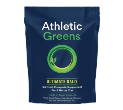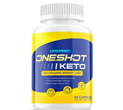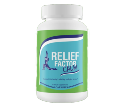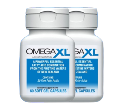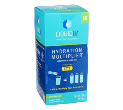The Best Muscle Recovery Supplements You Can Buy
Edited and medically reviewed by ✔️ Team of BestInSupplements | Written by Katelyn Johnson (B.S. and M.S. in Nutrition Science)
There are many supplements available on the market to help you with your muscle recovery. But, if you’re looking for the best muscle recovery supplement, read our review to learn about its advantages, uses, ingredients, and customer reviews.

Muscle recovery refers to the period following a workout when our bodies rest up in preparation for the next workout, which we expect to be at maximum capacity for 1. Here we will show you how muscle recovery supplements can help you with your performance.
Muscle recovery involves the regeneration of muscle and tissue, the removal of waste products, and the reduction of inflammation. Recovery is also meant to replace the nutrients and energy supplies required for cellular function between the brain and the body 2.
If you are looking for pre-workout: The Best Best Pre-Workout Supplements for Women You Can Buy
In case you are looking for the best muscle recovery supplements, you must know that it is important to choose supplements that promote tissue development in order to enhance muscle recovery 3.
Post-workout refueling is crucial for muscle recovery and function. There are numerous products on the market that claim to help and maximize your post-workout technique; however, it is critical to select a safe and highly rated recovery supplement.
The Academy of Nutrition and Dietetics, Dietitians of Canada, and the American College of Sports Medicine support post-workout replenishment of glycogen and protein stores with carbohydrate and protein-rich muscle recovery supplements such as bars, protein drinks, and electrolyte supplements 4.
Here You Will Discover More About:
What Is Muscle Recovery?
Muscle recovery is the period of time between the completion of one exercise and the beginning of the next.
When you exercise, your energy reserves are exhausted, your muscles and other tissues are broken down, and your body becomes fatigued. Endless exhaustion leads to an inability to adequately adapt, which leads to even more exhaustion, inflammation, and poor workouts. Before muscle development can be made, there must be a period of recovery 4.
Workout recovery is just as vital as lifting. This is when muscle recovery supplements are beneficial - even required - to help your body reenergize.
What Are Muscle Recovery Supplements?
High-intensity and long-duration workouts (over 60 to 90 minutes) deplete glycogen (energy) stores, break down muscle fibers, and trigger muscles to evolve. Muscle recovery supplements are something that aids in your recovery from workout #1 in time for workout #2, allowing you to push yourself each and every time 8.
Muscle recovery supplements like workout recovery drinks, powders, or capsules provide carbohydrates to replenish glycogen stores, protein for repairing and rebuilding muscle tissue, and fluids and electrolytes lost through sweat for rehydration 9.
Speaking about proteins: The Best Protein Pills You Can Buy
In general, supplements marketed as "muscle regeneration supplements" fall into one of the following categories:
- Supplements that increase metabolite clearance (lactic acid, ammonia, etc.) and, as a result, associate with fewer muscle soreness 10.
- Anti-inflammatories are supplements that can help with muscle soreness. Ideally, those that do not inhibit muscle growth rates 11.
- Things that can help muscle cells digest nutrients more effectively and, as a result of the nutrition given, heal faster.
Muscle injury and the markers for muscle damage are insufficient to show that anything aids recovery. This is mostly due to the fact that preventing muscle injury does not aid in muscle recovery.
In order for our muscles to develop and grow, we must first tear the muscle fibers. The proteins that develop your muscle fibers are destroyed when you workout. Consuming protein after a workout provides your body with the nutrients it requires to heal muscle damage.
It is important to note that there are occasions when you have a workout that is more for the neural side of things —improving your ability in a lift or improving muscle recruitment (think plyometric exercises and others like box jumps)— that the above doesn't really apply to because the muscles aren't the main goal of the workout.
The Best Muscle Recovery Supplements You Can Buy
Workout recovery supplements are an efficient and easy way to provide amino to your muscles to drive muscular protein synthesis, recuperation, and growth.
The best workout recovery supplements are available in a variety of forms, including powders, liquids, and capsules. If you dislike swallowing pills, protein powder or recovery drinks may be a better option for you. If you want a more convenient and portable supplement, capsules may be a better option.
Best Overall: Garden of Life Organic Grass Fed Whey Protein Powder
Garden of Life’s Organic Grass Fed Whey Protein Powder is a high-quality protein, multi-purpose powder-based drink. This protein powder aids in rehydrating and refueling the muscles with vital amino acids and easily digested carbohydrates.

According to a 2017 study, whey protein supplementation was shown to improve resistance-trained individuals' performance and recovery. Protein powder is an easy, safe, and inexpensive supplement that facilitates post-workout recovery 13.
Whey protein, such as Garden of Life's Organic Whey Protein, is a high-quality protein source that contains all essential amino acids as well as some branched-chain amino acids (BCAAs), which are necessary for muscle development.
This Certified USDA Organic (rBST and rBGH-free), Non-GMO Project Verified product offers plenty of protein as well as BCAAs and probiotics at a reasonable price. The powder is available in five flavors: chocolate, chocolate peanut butter, mildly sweet, strawberry, and vanilla.
Garden of Life whey is made from grass-fed cows raised on pasture and is American Humane Certified. Each serving contains 21g of protein, 2g of sugar, 120 calories, and 4.7g of BCAAs. Probiotics in the amount of 2 billion CFU are also included in the formula.

Best Ready-to-Drink Protein Shake: OWYN Only What You Need 100% Vegan Plant-Based Protein Shakes | Cold Brew Coffee
If you don't have access to a kitchen or a cafe, it can be difficult to get enough protein and carbohydrates after a workout; however, a ready-to-drink protein shake like OWYN makes it simple to get high-quality nutrition anywhere and at any time of day.
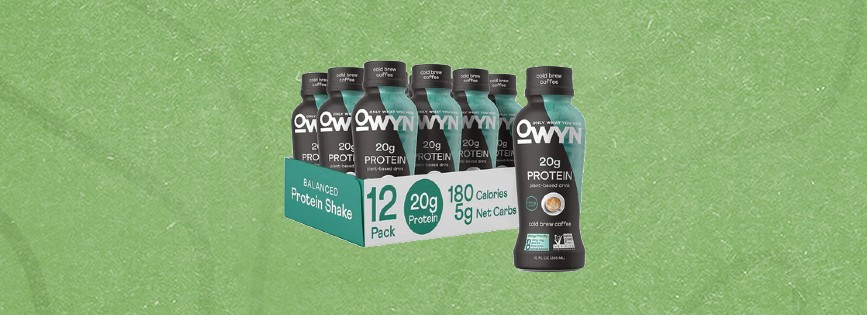
The delicious beverage doesn’t need to be refrigerated before serving, making it ideal for taking on the go to work, hiking, or anywhere you need to refill along the way. It's a simple post-workout recovery product with clean ingredients that cater to a wide variety of people, from vegan to omnivore.
OWYN, which stands for Only What You Need, creates its patented protein mix by combining pea protein, organic pumpkin seed protein, and organic flax oil. This vegan protein shake is ready to drink and contains 20 grams of plant-based protein per serving.
Discover more pea protein powders: The Best Pea Protein Powder You Can Buy
If you have food allergies, OWYN is probably better digestible for you as well because it is gluten-free, dairy-free, egg-free, soy-free, and tree nut-free. Smooth Vanilla, Dark Chocolate, Cookies N' Cream, and Cold Brew Coffee are just a few of the delectable flavors available.
Best Protein Bar: Papa Steve's No Junk Raw Protein Bars
Though it does not seem to be a "supplement," a protein bar is a great way to increase protein intake after a workout. Looking for a bar with a little more power? Papa Steve's No Junk Raw Protein Bars can be eaten as a fast on-the-go snack or as a filling post-workout snack.

Depending on the flavor, these bars have 12 to 20 grams of protein from raw whey or vegan protein sources, more than 50% of the recommended daily fiber intake, and less than 10 grams of sugar. The sugar in each bar is derived from raw dates and fruit.
Each bar is handcrafted in Southern California using non-GMO, gluten-free, and soy-free ingredients. They can be stored at room temperature for 45 days, in the refrigerator for two to three months, or in the freezer for up to six months.
Best Electrolyte Powder: Ultima Replenisher Electrolyte Hydration Powder
Electrolyte-enhanced post-workout recovery drinks aid in the replenishment of water, electrolytes, and energy lost during exercise. These beverages usually contain potassium, sodium, magnesium, and calcium, which aid in the prevention of dehydration, the prevention of muscle cramping, and the delay of fatigue.

Ultima's Replenisher Electrolyte Powder has no chemical ingredients and contains all six electrolytes (magnesium, potassium, sodium, chloride, calcium, and phosphorus).
Stevia is used to sweeten this beverage. Ultima is made with fruit flavors and comes in a variety of delectable flavors. The flavors are light and refreshing, not too sweet.
Unlike other powders, which can be chalky, Ultima mixes well and fully dissolves to form a smooth, hydrating drink. The versatile product is suitable for a variety of diets, including vegan, gluten-free, keto-friendly, paleo-friendly, and peanut-free. It is also caffeine-free for those who are caffeine-sensitive.
Best Creatine Supplement: Thorne Research Creatine Powder
Creatine is one of the most common and well-studied supplements for athletes. Creatine supplementation combined with resistance and weight training appears to improve muscle strength and lean tissue mass, according to research 14.

Thorne's Creatine Powder is an excellent choice for boosting capacity, improving muscle endurance, and promoting muscle growth. Creapure, an easily combined, highly researched type of creatine, is used in formulation 15. This is a micronized type of creatine monohydrate that is colorless, odorless, and easily dissolved. Each scoop contains 5 g of Creatine Monohydrate.
Since the supplement is NSF Approved for Sport, athletes may be certain that it has been tested and certified for consistency, purity, and protection. This certification mark ensures that the product is free of prohibited chemicals, that the contents match what you can expect from its label, and that there are no unhealthy levels of pollutants.
It also indicates that the manufacturing facility is GMP (short for “Good Manufacturing Practice”) registered and is subject to the regular quality and safety audits. The supplement is also allergy-friendly since it is free of gluten, meat, tree nuts, peanuts, dairy, soy, fish, and shellfish.
Best BCAA Powder: Thorne Research Amino Complex
When combined with a strength training program, BCAAs have been shown in studies to help develop muscle size and improve recovery 15. Thorne's Amino Complex is an excellent choice for a high-quality, delicious BCAA powder. The berry-flavored powder is sweetened with stevia and does not contain any artificial flavors.

Each scoop contains a total of eleven amino acids (all NINE essential amino acids), plus two non-essential amino acids (cysteine and tyrosine). These two amino acids are known as conditionally important amino acids because they are required in greater amounts during periods of physical stress, such as muscle recovery 16.
This powder is free of gluten, dairy, and soy. The product is NSF Certified for Sport, which means it has been checked to ensure it is free of banned substances and meets label claims.
The Best Fish Oil Supplement: Triton Fish Oil
Triton Fish Oil is what the perfect fish oil supplement should look like:
- 100% re-esterified triglyceride oil.
- Per serving, there is a significant amount of EPA and DHA.
- Generated from sustainably sourced and naturally low-polluting fish.
- Molecularly distilled to reduce pollutants to near-zero levels.

The oil in TRITON is re-esterified triglycerides derived from deep-water Peruvian anchovies and sardines captured by Friend of the Sea-approved fisheries.
It contains 2,400 milligrams of EPA and DHA per serving and has been manufactured using enhanced molecular distillation to reduce contaminants and chemicals in order to meet the strict EuropeanPharmacopoea Reference Standards (EPRS) as well as the voluntary standards set by the Council for Responsible Nutrition (CRN) and the Global Organization for EPA and DHA Omega–3 fatty acids (GOED).
Recharge Post-Workout
Recharge is a natural post-workout drink that promotes muscle development, enhances recovery, and alleviates muscle soreness. It includes 5g of micronized creatine, and 2.1 grams combined L-carnitine and L-tartrate.

L-carnitine is a naturally occurring amino acid that serves an important role in various body processes related to the production of cellular energy. The majority of L-carnitine in your body is found in your muscles, where it is used to quickly generate a significant amount of energy 17.
L-tartrate is a salt that is used in the body to improve nutrient absorption. When combined together, they are shown to reduce muscular injury and pain caused by exercise and enhance insulin sensitivity 18.
Take a look at this alternative: Premier Protein Shake Reviews, Ingredients, Does It Work?
The reason this post-workout recovery supplement works so well is simple: every ingredient is supported by peer-reviewed scientific evidence and is present at clinically effective levels 18. Recharge is also naturally sweetened and flavored, with no added food dyes, fillers, or extraneous ingredients.
The Bottom Line On Muscle Recovery
We want muscle damage to happen during exercise, but we don't want the muscle damage to keep us from working out the next day. The importance of good nutrition, sleep and knowing your boundaries is an important first step in maintaining this delicate balance. If you must take supplements, choose those that help your body handle nutrients.
Picking a post-workout supplement can be a daunting task. What it boils down to is this: find one that nourishes muscle cells, triggers them to grow, and further improves energy consumption in the muscle cell.
Also - pairing a post-workout supplement with nutrients via dietary intake is a great way to boost your recovery.
Frequently Asked Questions
References
- Carraro, F. A. B. I. O., Stuart, C. A., Hartl, W. H., Rosenblatt, J. U. D. A. H., & Wolfe, R. R. (1990). Effect of exercise and recovery on muscle protein synthesis in human subjects. American Journal of Physiology-Endocrinology And Metabolism, 259(4), E470-E476.
- Best, T. M., & Hunter, K. D. (2000). Muscle injury and repair. Physical medicine and rehabilitation clinics of North America, 11(2), 251-266.
- Cooper, R., Naclerio, F., Allgrove, J., & Jimenez, A. (2012). Creatine supplementation with specific view to exercise/sports performance: an update. Journal of the International Society of Sports Nutrition, 9(1), 33. https://doi.org/10.1186/1550-2783-9-33
- Nutrition and Athletic Performance, Medicine & Science in Sports & Exercise: March 2016 - Volume 48 - Issue 3 - p 543-568 doi: 10.1249/MSS.0000000000000852
- Proske, U., & Morgan, D. L. (2001). Muscle damage from eccentric exercise: mechanism, mechanical signs, adaptation and clinical applications. The Journal of physiology, 537(Pt 2), 333–345. https://doi.org/10.1111/j.1469-7793.2001.00333.x
- Verstegen, M., & Williams, P. (2004). Core performance: the revolutionary workout program to transform your body and your life. Rodale.
- Thomas, D. T., Erdman, K. A., & Burke, L. M. (2016). Position of the Academy of Nutrition and Dietetics, Dietitians of Canada, and the American College of Sports Medicine: nutrition and athletic performance. Journal of the Academy of Nutrition and Dietetics, 116(3), 501-528.
- McHugh, M. P., Connolly, D. A., Eston, R. G., & Gleim, G. W. (1999). Exercise-induced muscle damage and potential mechanisms for the repeated bout effect. Sports medicine (Auckland, N.Z.), 27(3), 157–170. https://doi.org/10.2165/00007256-199927030-00002
- Järvinen, T. A., Järvinen, T. L., Kääriäinen, M., Äärimaa, V., Vaittinen, S., Kalimo, H., & Järvinen, M. (2007). Muscle injuries: optimising recovery. Best Practice & Research Clinical Rheumatology, 21(2), 317-331.
- Rountree, S. (2011). The Athlete's Guide to Recovery: Rest, Relax, and Restore for Peak Performance. VeloPress.
- Robergs, R. A., Ghiasvand, F., & Parker, D. (2004). Biochemistry of exercise-induced metabolic acidosis. American Journal of Physiology-Regulatory, Integrative and Comparative Physiology.
- Stannard, S., Houltham, S., & Starck, C. (2017). Category: Muscle Soreness Research. Journal of the International Society of Sports Nutrition, 14(12).
- Myers, S. No Pain, No Gain? Muscle damage and recovery are crucial to muscle development.
- Jäger, R., Kerksick, C. M., Campbell, B. I., Cribb, P. J., Wells, S. D., Skwiat, T. M., ... & Antonio, J. (2017). International society of sports nutrition position stand: protein and exercise. Journal of the International Society of Sports Nutrition, 14(1), 1-25.
- Arazi, H., Eghbali, E., & Suzuki, K. (2021). Creatine Supplementation, Physical Exercise and Oxidative Stress Markers: A Review of the Mechanisms and Effectiveness. Nutrients, 13(3), 869. https://doi.org/10.3390/nu13030869
- Carvalho, A., Mourão, P., & Abade, E. (2014). Effects of strength training combined with specific plyometric exercises on body composition, vertical jump height and lower limb strength development in elite male handball players: a case study. Journal of human kinetics, 41, 125.
- Evans, A. M., & Fornasini, G. (2003). Pharmacokinetics of L-carnitine. Clinical pharmacokinetics, 42(11), 941–967. https://doi.org/10.2165/00003088-200342110-00002
- Spiering, B. A., Kraemer, W. J., Vingren, J. L., Hatfield, D. L., Fragala, M. S., Ho, J. Y., Maresh, C. M., Anderson, J. M., & Volek, J. S. (2007). Responses of criterion variables to different supplemental doses of L-carnitine L-tartrate. Journal of strength and conditioning research, 21(1), 259–264. https://doi.org/10.1519/00124278-200702000-00046
Every editorial product is independently selected, though we may be compensated or receive an affiliate commission if you buy something through our links.
Recently Purchased


